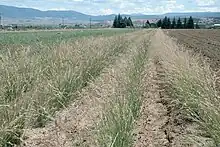| Bromus marginatus | |
|---|---|
 | |
| Scientific classification | |
| Kingdom: | Plantae |
| Clade: | Tracheophytes |
| Clade: | Angiosperms |
| Clade: | Monocots |
| Clade: | Commelinids |
| Order: | Poales |
| Family: | Poaceae |
| Subfamily: | Pooideae |
| Genus: | Bromus |
| Species: | B. marginatus |
| Binomial name | |
| Bromus marginatus | |
Bromus marginatus is a species of grass known by the common name mountain brome. It is native to western North America, and it is used widely for grazing animals and revegetating landscapes.[1]
This short-lived perennial grass forms a large, shallow root network. The roots give it drought-tolerance,[2] and they persist in the soil long after the plant has died, making it valuable for erosion control.[1] The stems can usually reach one meter in height but are known to reach 1.5 meters. The hairy leaves are up to a centimeter wide. The inflorescence is a nodding panicle of spikelets, each with up to 10 flowers.[1]
In the wild in its native range this grass grows in moister areas in mountain sagebrush, scrub, and meadows into the subalpine climate. It can tolerate thin, dry soils and some shade. It establishes easily and can become weedy. It can be planted on slopes and uneven terrain using a broadcast seeding method.[1]
There are several cultivars of this grass, including 'Garnet', 'Bromar',[1] and 'Tacit'.[2][3] The latter has been known to produce 15 tons per hectare with 3 to 4 harvests per year.[3]
References
- 1 2 3 4 5 Bromus marginatus. USDA NRCS Plant Guide.
- 1 2 Rajčáková, Ľ., et al. (2006). Nutrition value of Bromus marginatus and possibilities to regulation of fermentation in ensilage process. Slovak J Anim Sci 39 93-97.
- 1 2 Míka, V., et al. (2004). Performance of grass mixtures with mountain brome (Bromus marginatus Nees ex Steud.) in Central European lowlands. Plant Soil Environ 50(3) 101-07.
External links
 Media related to Bromus marginatus at Wikimedia Commons
Media related to Bromus marginatus at Wikimedia Commons- "Bromus marginatus". Plants for a Future.
- USDA Plants Profile
- NatureServe
